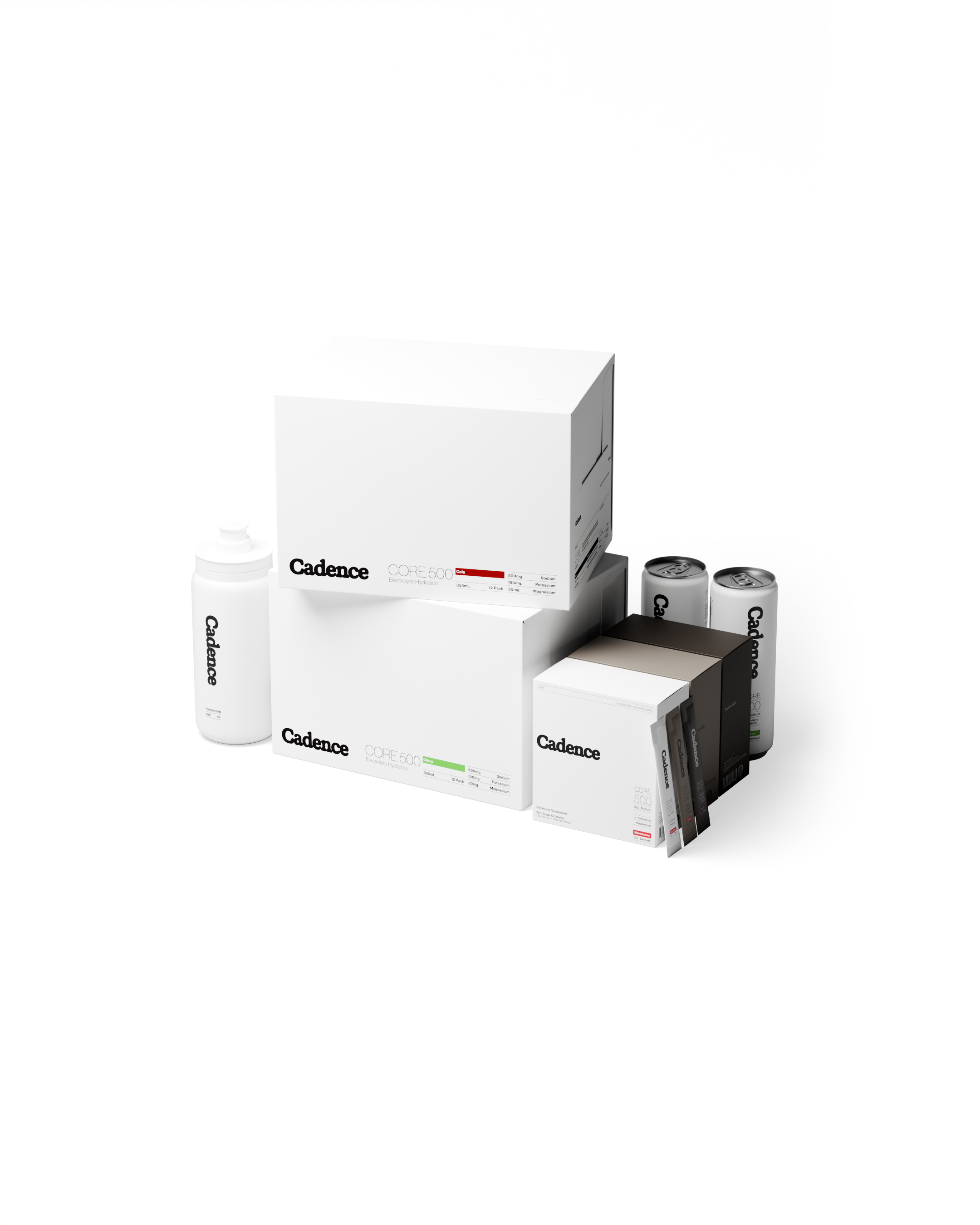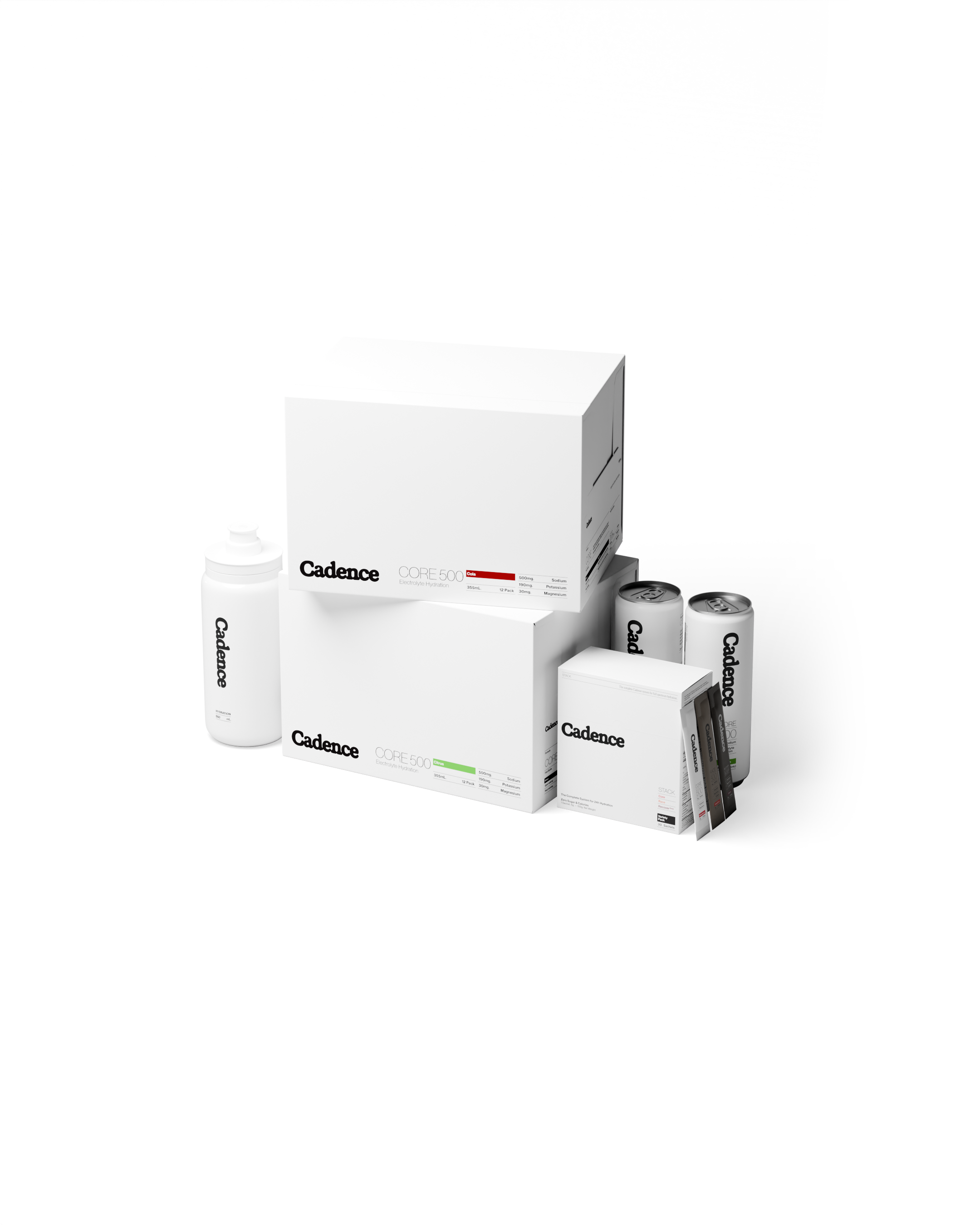Introduction
Optimising your hydration is a key factor for achieving and maintaining peak performance in physical activities. It's important to understand that hydration is not just about drinking water; it's also about how your body manages and utilises that water. Electrolytes such as sodium, magnesium, and potassium, are essential to the hydration process, helping to regulate fluid balance, muscle function, and nerve signalling.
Cadence™ Electrolyte Hydration, with a science backed ratio of these three key electrolytes, is designed to optimise hydration more effectively than water alone. This article explores these electrolytes may hydrate you better than just water.
What are Electrolytes?
Electrolytes are charged minerals critical for numerous physiological functions.
Sodium: Sodium is instrumental for maintaining fluid balance and thirst regulation. It helps retain water in the body whilst also stimulating thirst, encouraging you to consume more fluids which leads to better hydration (Del Coso et al., 2016).
Magnesium: Magnesium is involved in over 300 enzymatic reactions in the body (Al Alawi et al., 2018). It plays a key role in energy production as well as transporting water into cells, improving hydration at a cellular level.
Potassium: Potassium helps to maintain cellular fluid balance alongside sodium, whilst also supporting nerve function and muscle contractions (Maughan et al., 1997).
These three electrolytes may often be depleted through your sweat during intense activities such as exercise; just replacing the lost fluid with water may dilute the body’s electrolyte balance, making replacing lost electrolytes through your diet or supplementation just as important as consuming water.
Water + Electrolytes vs Just Water
Better Fluid Retention
Sodium is essential for fluid retention and may also help avoid hyponatremia (Von Duvillard et al., 2004), a common condition amongst athletes who drink excessive water without sufficiently replacing electrolytes. Del Coso et al (2016) emphasise sodium’s role in augmenting water retention and promoting thirst, which helps maintain hydration better than just drinking water on its own.
Electrolyte Balance
Magnesium plays a role in moving water into cells, which is instrumental for maintaining electrolyte and fluid balance within the body. We implemented magnesium in its magnesium lactate form as it is more bioavailable compared to others that are often included in supplements.
Cellular Function
We included potassium chloride in our Electrolyte Hydration Drinks to help counteract the depletion of potassium through sweat during exercise. Maughan et al. (1997) found that adequate potassium intake is essential for recovering electrolyte balance post exercise, potentially aiding in muscle function and preventing cramps.
Conclusion
Cadence™ Electrolyte Drink may hydrate better than water by effectively replenishing essential electrolytes and managing fluid balance. Studies provide robust evidence of the benefits of electrolyte supplementation in hydration, especially for athletes and individuals engaged in high intensity activities. Our Core Hydration Electrolyte Sticks offer a convenient option for taking electrolytes. If you would like to sample our full range of electrolyte sachets, then you should also take a look at our variety pack of hydration sticks.
References
Del Coso J, González-Millán C, Salinero JJ, Abián-Vicén J, Areces F, Lledó M, Lara B, Gallo-Salazar C, Ruiz-Vicente D. Effects of oral salt supplementation on physical performance during a half-ironman: A randomized controlled trial. Scand J Med Sci Sports. 2016 Feb;26(2):156-64. doi: 10.1111/sms.12427. Epub 2015 Feb 14. PMID: 25683094.
Al Alawi AM, Majoni SW, Falhammar H. Magnesium and Human Health: Perspectives and Research Directions. Int J Endocrinol. 2018 Apr 16;2018:9041694. doi: 10.1155/2018/9041694. PMID: 29849626; PMCID: PMC5926493.
Maughan, R. J., Leiper, J. B., & Shirreffs, S. M. (1997). Recovery from Prolonged Exercise: Restoration of Water and Electrolyte Balance. Journal of Sports Sciences, 15(3), 297-303.
Von Duvillard, S. P., Braun, W. A., Markofski, M., Beneke, R., & Leithäuser, R. (2004). Fluids and Hydration in Prolonged Endurance Performance. Nutrition, 20(7-8), 651-6.

